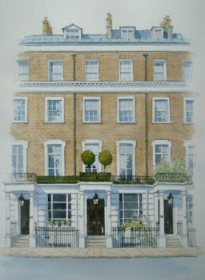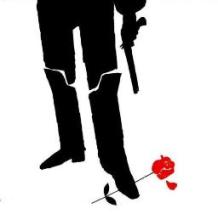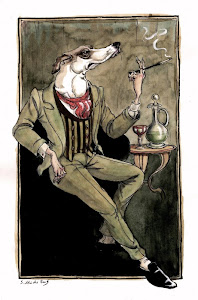 'The fundamental sociological point that the Handbook [The Official Sloane Ranger Handbook: How The British Upper Class Prepares Its Offspring For Life, by Ann Barr and Peter York, 1983] makes, and Veblen would wholeheartedly endorse, is that Sloanes are ‘a living museum of old modes of behaviour’. The authors have rightly discerned that what the accoutrements and appurtenances of Sloane life unwittingly reveal is a 19th-century view of the 18th century, sustained and exemplified by token symbols of warrior/landowner gentrydom, which would be quite unrecognisable to a real Fielding squire. The obsession with the ubiquitous Horse Motif, the quasi-military trophies and table-mats, the taste for archaic breakfast food, the staunch preference for Georgian wood and silver, the too-prominent placing of the dog-basket, the Fields and Horse and Hounds in the downstairs loo, Caroline’s incurable addiction to Debrett, Henry’s thin, gold, oval, engraved, not swivel-backed cufflinks, the nostalgic love of dhurries and Mogul hangings and Indian bedspreads (even if Grandfather wasn’t in the Indian Army or ICS), the silk shirts ‘copied by Sam on a business trip to Hong Kong’, even the Sloanes’ ‘keen as bloodhounds’ sensitivity to the smells of boats, bonfires, leather and high-octane petrol (good) and aeroplanes, old vase-water, imitation leather and diesel oil (bad), are all symptoms of a half-conscious ideology whose deep structure is explicable only by reference to an unbreakable attachment to tradition: ‘Sloanes put tradition top because it keeps them top’ – or near enough to it to keep them happy.
'The fundamental sociological point that the Handbook [The Official Sloane Ranger Handbook: How The British Upper Class Prepares Its Offspring For Life, by Ann Barr and Peter York, 1983] makes, and Veblen would wholeheartedly endorse, is that Sloanes are ‘a living museum of old modes of behaviour’. The authors have rightly discerned that what the accoutrements and appurtenances of Sloane life unwittingly reveal is a 19th-century view of the 18th century, sustained and exemplified by token symbols of warrior/landowner gentrydom, which would be quite unrecognisable to a real Fielding squire. The obsession with the ubiquitous Horse Motif, the quasi-military trophies and table-mats, the taste for archaic breakfast food, the staunch preference for Georgian wood and silver, the too-prominent placing of the dog-basket, the Fields and Horse and Hounds in the downstairs loo, Caroline’s incurable addiction to Debrett, Henry’s thin, gold, oval, engraved, not swivel-backed cufflinks, the nostalgic love of dhurries and Mogul hangings and Indian bedspreads (even if Grandfather wasn’t in the Indian Army or ICS), the silk shirts ‘copied by Sam on a business trip to Hong Kong’, even the Sloanes’ ‘keen as bloodhounds’ sensitivity to the smells of boats, bonfires, leather and high-octane petrol (good) and aeroplanes, old vase-water, imitation leather and diesel oil (bad), are all symptoms of a half-conscious ideology whose deep structure is explicable only by reference to an unbreakable attachment to tradition: ‘Sloanes put tradition top because it keeps them top’ – or near enough to it to keep them happy.There is, to be sure, a Darker Side. But true to the spirit of Malinowski, the authors do not shrink from revealing it, too (if only because it turns out to be almost touchingly harmless). Sloanes do commit a lot of traffic offences, and not infrequently cheat on their income tax. A few Henrys are unmistakable ‘four-letter men’, even if they seldom qualify as roaring shits on the full-blooded patrician and/or bohemian scale. There may well be a naughty uncle living in Marrakesh with ‘others of his ilk’, and another being dried out at the Priory in Roehampton or the Crichton in Dumfries. Sloane marriages do quite often come unstuck, whether just because Henry’s ‘moved into his dressing-room’ or because he’s decamped with his secretary, the nanny or his best friend’s wife, in which case Caroline (unless she’s the best friend’s wife in question) goes vengefully off on a Serenissima culture tour. Sloanes are not, on the whole, very charitable. Caroline can be not only meaninglessly gushing, but unpleasantly callous. (The authors are a little ambivalent about this: they are right that Ranger understatement is sometimes misinterpreted by outsiders as callousness, but they also recognise that ‘other Sloanes can be cruel if someone’s “a bit of a mess” ’ – i.e. a ‘fermented boozy’ who’s gone ‘well and truly off the rails’). More of them than are aware of it themselves are intermittent and sometimes chronic depressives, but it’s out of the question to go to a Shrink in (Dreaded) Hampstead or even to admit to the possibility of a need for one (‘You would be a behaviourist – if you knew what it meant’). The real trouble is that Sloanes are not merely ineducably complacent, but indefatigably resistant to any remote possibility of seeing themselves as others see them.'
'Henry and Caroline', by W.G. Runciman, London Review of Books, Vol. 5 No. 6 . 1 April 1983





















2 comments:
Well put.
The article continues with another rather amusing paragraph: "So come the Revolution, what then? Nothing recorded in the Handbook will redeem Henry and Caroline in the eyes of Bolshie Scargill, class-traitor Benn and the enragés of the Lumpen Polytechniat. Hauled by Red Guards before a People’s Court, they will at once be condemned as parasites, exploiters, racists, sexists, imperialists, warmongers and lackeys of international capitalism. The Old Vicarage will be taken over by a free-loving trade-union commune of braless women and bearded men in gungey dungarees, growing ecological vegetables and Marching for Peace. Gone will be the income from Caroline’s (badly-invested) little Trust, gone Henry’s salary from the merchant wank, gone the hard-earned joys of the ski-slope and the hunting-field, gone Ludgrove and Lady Eden’s and the St Andrew’s Day Wall Game (‘No goals have been scored since the First World War, but Henry is always hoping’), gone the Bullingdon point-to-point, gone Glyndebourne, gone the Norland Nannies, gone the teeny silver thimbles, gone the favourite watering-hole ‘where Toby practically lives’, gone Turnbull & Asser and Swaine Adeney, Brigg & Sons and the Burlington Arcade. "
Post a Comment